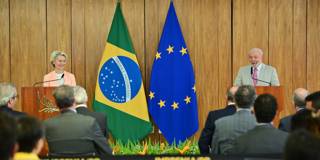A trade deal with Mercosur, a resource-rich bloc with a highly productive agricultural sector, could help the European Union accelerate the green transition and improve food security. But if European policymakers continue to drag their feet on negotiations, the four Latin American countries could seek closer ties with China.
ANGERS – Trade negotiations between the European Union and Mercosur (Argentina, Brazil, Paraguay, and Uruguay) began in 1999 and, illustrating the challenges inherent in forging trade pacts among blocs with diverging national interests, resulted in a provisional agreement only in 2019. Since then, efforts to finalize the agreement have floundered. European leaders must recommit to reaching a deal, which will require deft diplomacy.

ANGERS – Trade negotiations between the European Union and Mercosur (Argentina, Brazil, Paraguay, and Uruguay) began in 1999 and, illustrating the challenges inherent in forging trade pacts among blocs with diverging national interests, resulted in a provisional agreement only in 2019. Since then, efforts to finalize the agreement have floundered. European leaders must recommit to reaching a deal, which will require deft diplomacy.